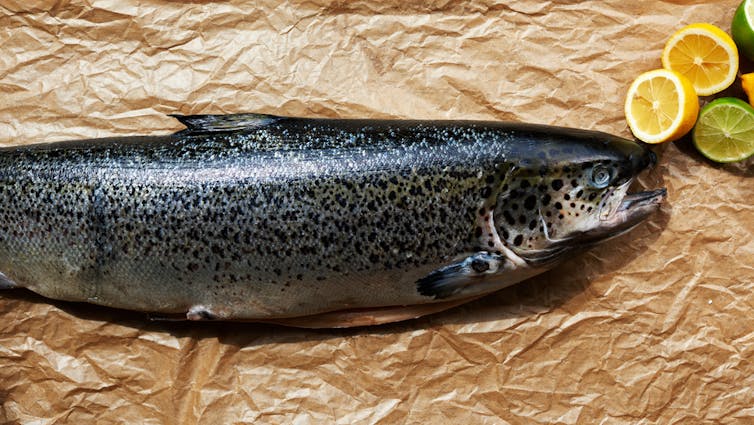
Caroline Taylor, University of Bristol
As soon as women find out they’re pregnant, they are overwhelmed with information about what they can – or more likely can’t – eat and drink. Off the menu go soft cheeses, partially cooked eggs, raw meat, pâté, liver, caffeine, alcohol. It’s a lot to remember.
But the advice on eating fish when pregnant is the by far the most complex. Does it need to be so complicated? What is the actual evidence of the risks and benefits of eating fish for a mother-to-be?
The UK Food Standards Agency, through NHS Choices, gives advice to pregnant and breastfeeding women, as well as women planning to become pregnant. It focuses on the consumption of mercury and chemicals known as polychlorinated biphenyls (PCBs) and dioxins in fish and seafood.
The guidelines for women planning to become pregnant and pregnant women include three fish to avoid completely. These are the predatory species, marlin, shark and swordfish. There is also information on limiting intake of other fish, such as fresh and canned tuna.
The guidelines for women who are breastfeeding differ slightly. For them, predatory fish are allowed once a week and there is no limit on canned tuna.
Crucially, the guidance also includes a recommendation to eat at least two portions of fish a week, at least one of which should be oily – important advice that is mentioned only in passing on the NHS Choices web page.
It all adds up to a complicated set of advice. To be able to follow it, women are required to distinguish correctly between different species of fish. They need to be able to identify oily fish and to keep a weekly tally of the number of portions of different species they have eaten.
Mercury exposure and child development
There is growing evidence of benefits to the health and development of the baby if women eat fish while pregnant, despite the mercury content. In the UK, a study in which pregnant women were recruited and their children followed up for many years (the Avon Longitudinal Study of Parents and Children ALSPAC) showed that eating fish makes only a small contribution to blood levels of mercury during pregnancy.
Eating two to three portions of fish a week had beneficial effects on measurements of child development, suggesting that limiting fish intake might actually be harmful. For instance, there was no effect of eating fish on the chances of the baby being pre-term or born with a low birthweight. In fact, birthweight was lower in the babies of women who did not eat fish during pregnancy. Other measurements of later child development, such as child behaviour, social, motor and communication skills, and IQ also showed no link with the women’s blood mercury levels during pregnancy.
Similar results have been found in the Seychelles Development Study, where women eat fish every day and are likely to have higher mercury levels than in the UK.
Antenatal nutrition
The beneficial effects of eating fish on the baby’s development are probably due to the nutrients provided by fish – particularly vitamin D, iodine, selenium and omega-3 fatty acids – which could protect against any potentially harmful effects of mercury.

Shutterstock
Women who give up eating fish during pregnancy are probably missing out on these positive effects.
In the face of the confusing and complicated guidelines, it is likely that many women simply give up eating fish altogether. This is certainly the case in the US in the face of equally complex national information. There is no doubt that women in the UK who are of child-bearing age (16-49 years old) eat considerably less than the recommended minimum two portions of fish a week.
Better advice
There is clearly a danger that the message to eat at least two portions of fish per week during pregnancy and breastfeeding is being lost in the complex guidelines. Simplification would help to resolve this.
Firstly, the recommendation to eat at least two portions of fish per week, at least one of which should be oily, should be the main headline message.
Second, the advice on fish to avoid, limit and eat freely should be removed. Third, the guidelines should apply equally to pregnant women, those planning to become pregnant and those who are breastfeeding.
![]() These simple changes to the guidelines would help women get the maximum benefit from eating fish, whether the’re pregnant, planning to be pregnant, or breastfeeding. And they would ensure the very best future for their children.
These simple changes to the guidelines would help women get the maximum benefit from eating fish, whether the’re pregnant, planning to be pregnant, or breastfeeding. And they would ensure the very best future for their children.
This article was originally published on The Conversation. Read the original article.
Click here to view the PolicyBristol Policy Report on this issue.
